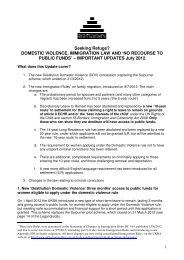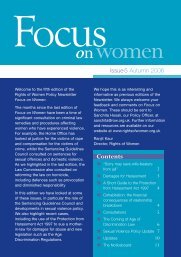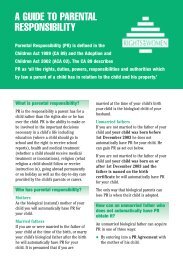Seeking Refuge? - Rights of Women
Seeking Refuge? - Rights of Women
Seeking Refuge? - Rights of Women
You also want an ePaper? Increase the reach of your titles
YUMPU automatically turns print PDFs into web optimized ePapers that Google loves.
7<br />
Successful applications: an explanation<br />
<strong>of</strong> leave to remain in the UK<br />
Introduction<br />
If you have been successful in your application for<br />
protection in the UK, you will be given a form <strong>of</strong><br />
leave to remain in the UK. The type <strong>of</strong> leave that<br />
you get and the rights that you have, for example,<br />
whether you can work or have family members<br />
come and join you, will depend on the type <strong>of</strong><br />
your case and when your application was decided.<br />
This Chapter will describe the different types <strong>of</strong><br />
leave, so that you know what your rights are.<br />
Leave to remain in the UK is permission,<br />
from the Home Office, to live in the UK. There<br />
are many different types <strong>of</strong> leave to remain.<br />
Some are for particular amounts <strong>of</strong> time, such<br />
as five years, while others allow you to remain<br />
in the UK for the rest <strong>of</strong> your life. Different<br />
types <strong>of</strong> leave have different rights that go with<br />
them. You need to know what type <strong>of</strong> leave<br />
you have and for how long, so that you know<br />
what your rights are.<br />
This Chapter will explain:<br />
• <strong>Refuge</strong>e Leave<br />
• Humanitarian Protection<br />
• Discretionary Leave<br />
• Indefinite Leave to Remain<br />
• Temporary Protection<br />
For information about the law that determines<br />
who is entitled to which form <strong>of</strong> leave, see<br />
Chapter 2.<br />
The law discussed here is very complicated.<br />
This Chapter is written to give you<br />
information about the law, but it is not legal<br />
advice. If you have applied for protection in<br />
the UK, or are thinking about doing this, it is<br />
very important that you seek legal advice<br />
from a solicitor or immigration advisor. You<br />
can also contact <strong>Rights</strong> <strong>of</strong> <strong>Women</strong>’s legal<br />
advice line. See Chapter 12 at the end <strong>of</strong> this<br />
book for information about organisations<br />
that provide legal advice.<br />
<strong>Refuge</strong>e Leave<br />
<strong>Refuge</strong>e Leave (formerly <strong>Refuge</strong>e Status) is given<br />
for five years to those who are recognised as<br />
refugees under the <strong>Refuge</strong>e Convention. If you<br />
have <strong>Refuge</strong>e Leave, you have the right to work<br />
and claim housing support and welfare benefits.<br />
Anyone who was dependent on your claim, such<br />
as your husband or children, will also usually be<br />
given <strong>Refuge</strong>e Leave. Certain members <strong>of</strong> your<br />
family who are not in the UK, such as children or<br />
your husband, can apply for family reunion to<br />
come and join you.<br />
Family reunion is the ability to be reunited<br />
with certain members <strong>of</strong> your family. This only<br />
applies to people who were members <strong>of</strong> your<br />
family before you were forced to leave your<br />
country. Family members who are eligible for<br />
family reunion are your husband, civil partner<br />
and any children you have who are under 18.<br />
Other members <strong>of</strong> your family, for example,<br />
your elderly parents, may be allowed to come<br />
to the UK if there are strong, compassionate<br />
reasons.<br />
If you have <strong>Refuge</strong>e Leave you are entitled to<br />
make an application to the UK Border Agency 21<br />
for a refugee travel document which will enable<br />
you to travel to other countries. You may go<br />
anywhere you would like to with the travel<br />
document except your own country. If you do<br />
obtain a refugee travel document and you want<br />
to travel abroad, you will need to check with that<br />
country’s embassy as you may need a visa to<br />
travel there. For further information about<br />
applying for travel documents, talk to your legal<br />
advisor, or visit the UK Border Agency website at:<br />
www.ukba.home<strong>of</strong>fice.gov.uk/ukresidency/<br />
traveldocuments/.<br />
21<br />
It used to be called the Border and Immigration Agency (the BIA) and before that the Immigration and Nationality Directorate<br />
(the IND).<br />
41
















